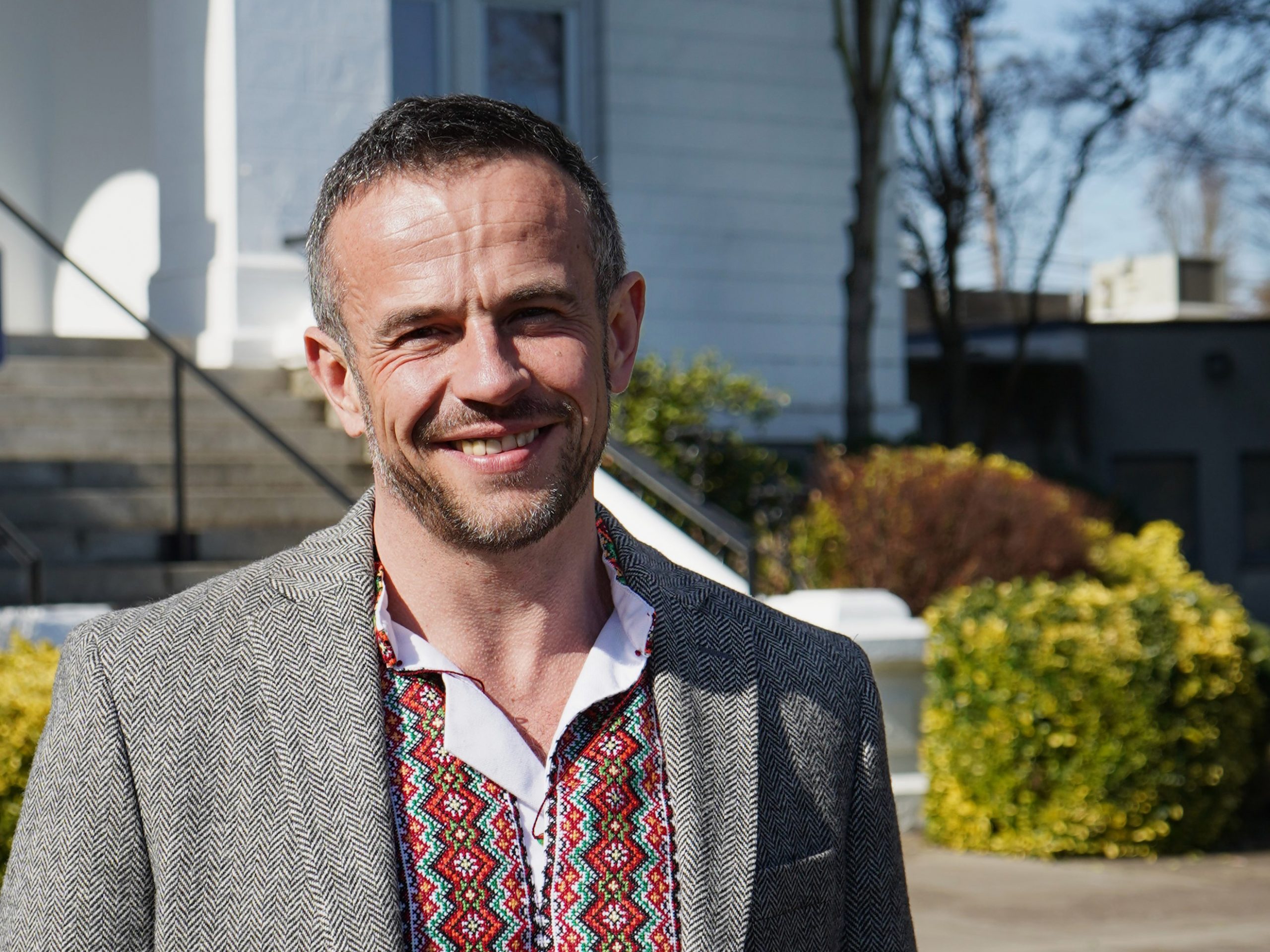Misha Zyryanov grew up running around the slow paced town of Uzhhorod, Ukraine, smoking cigarettes where nobody could see him.
The Uzh river separated downtown Uzhhorod, where Zyryanov went to school, from his home–an apartment with his mother, father, sister and grandmother.
Zyryanov was born in Uzhhorod in 1983. He grew up with a younger sister, while his older half sister lived with her mother.
With three rooms total, five people and always a pet, Zyryanov never knew personal space. Apartments were built the same during the time Ukraine was part of the Soviet Union, each with minimal space. In confined quarters, there was no such thing as secrets between neighbors.
“Communist culture creates a specific bond between families. So you – whether you like it or not– are more integrated in someone’s lives than you would like to,” Zyryanov says.
Little did Zyryanov know at the time, but he was living amidst the collapse of the Soviet Union, when Ukraine became independent for the first time in its history.
This caused a collapse in the economy, which resulted in a deficit of goods from salt and matchsticks to food staples like cheese and sausage. Still, Zyryanov had a happy childhood.
“I was happy to be healthy and just running around on a sunny day was just normal childhood,” Zyryanov says.
His first job was at age nine, when the borders into Ukraine opened up. Entrepreneurs were allowed to cross the borders once per day, selling goods such as gas at higher prices due to cost differences. Zyryanov and his friends would set up shop by hotels and wash the entrepreneur’s cars for $1-$2, which he said was great pocket money during 90’s Ukraine.
“Carrying let’s say 100 gallons (of gas) can make you like 100 bucks, which was crazy…my parents salary for months was $40 per month,” Zyryanov says.
Zyryanov played basketball, soccer and table tennis during his youth, mainly soccer because it was easy to find an object to kick around, using rocks to set up goals. When he attended Uzhhorod National University, he played basketball while studying economics and accounting.
After graduating, Zyryanov worked as an accountant and economist in Ukraine. However, he wanted to explore the world outside of Uzhhorod and signed a two-year contract to work in Denmark. First, he wanted to learn English at the local school, as his job as a veterinarian on a farm required English communication. He learned basic English at his university, but needed more experience before he moved.
Little did he know, but he was placed in the class with the woman he would marry, Hannah Bittner. She was from Corvallis, Ore., and moved to Uzhhorod after graduating from Oregon State University to teach English. After hearing that Bittner missed her dogs back home, Zyryanov invited her on a walk with his dog.
A few walks later, Zyryanov and Bittner had fallen in love. When it came time to move to Denmark, Zyryanov invited Bittner to join him. They left together in 2015 and when the contract ended, the two moved to Corvallis and got married.
Zyryanov had never visited the United States before moving. He says his in-laws were kind and helped him ease into life in the U.S., encouraging him to be a tourist for the first few months.
Instead, within three weeks Zyryanov was hired as a driver for a company, moving around between jobs until he landed a position at a cellular company.
Though he is far from home, Zyryanov said Bittner made Corvallis feel like Ukraine.
“When you walk into our house, you’re in Ukraine, you’re not in the U.S. anymore,” Bittner says.
In 2022, when the Russia-Ukraine war started, Zyryanov and Bittner jumped into action.
With friends and family still in Ukraine, they began a nonprofit, Ukraine Assistance Network, to raise funds for the military. Many Ukrainians fled Eastern Ukraine to Uzhhorod, a safe space for internally displaced persons. They raised roughly $200,000 in the first year of the war.

Bittner travels once a year to Uzhhorod to provide support hands-on, but Zyryanov hasn’t been able to visit for the past two years. As a male under 65, he would be forced to join Ukraine’s military if he returned.
Zyryanov says there is major generational trauma for the people in Uzhhorod after the war started–the city is not what it used to be.
“(There are) displaced people everywhere, seeing people lost on the streets with all their lives packed in one suitcase with their kids running around, sleeping on the floors of the school gyms and they have been doing that for two years now,” Zyryanov notes.
The couple has been fundraising for UAN every Saturday in front of the Benton-County Courthouse since the war began. They plan to fund the Ukrainian military until the war ends, which they hope is in Ukraine’s favor.

“Sometimes it’s ten people, sometimes it’s fifty people on Saturdays. Whether it’s rain or shine there are people out there holding Ukrainian signs,” Zyryanov says.
Bittner says she thinks Zyryanov is a great example of Ukrainian resilience during the war.
“Misha has a full life in the US, he works full time…but he has this whole other life that’s devoted to resisting (the war),” Bittner says. “Much of his free time is focused on the war because he also doesn’t have much of a choice. It’s his family that’s at risk.”
—
This profile was first written for Professor Sindya Bhanoo’s journalism course at Oregon State University and was supported by an OSU Internationalization Grant.

